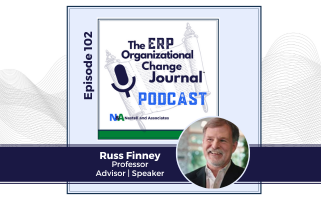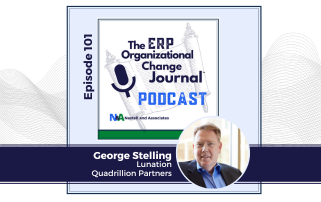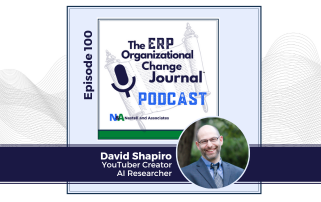Research has a great deal to offer ERP practitioners when it comes to organizational communication optimization.
Article Contents
- Communication optimization: Why does research matter to ERP practitioners?
- Principle Needs to Support ERP Communication Optimization Practice
- A Practical Model for Effective ERP Communication Optimization
ERP Communication Optimization: Why Does Research Matter to ERP Practitioners?
Research has a great deal to offer ERP practitioners when it comes to organizational communication optimization during ERP implementations (i.e. ERP communication optimization). Some industries, trades, and practices leverage applied research more than others. We all know that there are successful ERP projects, of course. We know that sometimes this success can also come with a higher than needed cost in terms of the organizational resources of time, money, and effort. We also know from objective sound research that in our trade of ERP organizational change there can be many challenges, failures, and potential risks.
As in many other trades, ERP organizational change practitioners would benefit from leveraging organizational learning, case study, and applied research. As critical as it is, experience is not the only tool that creates future success. Experience can vary greatly and be significantly impacted by organizational context, time, and outside influences. However, sound approaches and models based on proven principle apply across context. In addition to experience, applied research, case study, sound principle, and sharing are significant tools for any organization. This perpetual learning is a competitive advantage and valuable asset for any organization or ERP change agent.
Principle Needs to Support ERP Communication Optimization Practice
It is not only a necessity to understand and provide practical insights, tangible tips, and best practices but it is also important as practitioners that these practical insights, tangible tips, and best practices are based on approaches and models established in sound principle. If not, they are bound to fail and may not apply across organizational contexts.
ERP organizational change needs to be approached in meaningful ways. That is, as in any trade or practice (especially organizational change) an approach not grounded and legitimized in sound principle is likely to struggle if not fail. This is why the practical approach needs to be founded in principle when it comes to ERP organizational change.
A Practical Model for Effective ERP Communication Optimization
As discussed in our previous post, we consider the Kotter’s eight-step model (by Dr. John Kotter) providing great insight into the critical components to be considered for communication optimization. Significant variance in expectations, realities, and organizational diversity is a major contribution to organizational disconnects that would be addressed with more effective communication. And we would layer in, and emphasize, the idea from Lewis (2007) that organizations need to minimize negative politics. I would include addressing politics under Kotter’s “corporate culture” bucket. Politics can, in part, be addressed via optimized communication. Organizational stakeholder dynamics can be quite complex making effective organizational communication a key to any organizational change model and process. Being able to effectively communicate to and among each stakeholder strata as well as building effective communication and change within your organization via effective stakeholder communication is critical. As Lewis (2011) states, our connections and identities with stakeholder groups may have significant influence on how an employee views any given change initiative and whether or not that employee will support the change. Lewis (2005) further explains that individual connections and influences have a profound influence on how any individual reacts to supporting a change effort. In other words, effective communication with and throughout all stakeholder groups can help minimize the impact of individuals reacting to change more as a “monkey see monkey do” response instead of through a clear understanding of the vision, value, and purpose of the change. The reality is that sometimes politics is a major factor. This notion is further highlighted by Hogan (2010) who forwards the work of Skinner (1939), Watson (1913), Barker (1968) by suggesting that most behavior was not determined “by individual-specific stimulus-response patterns but was instead guided by the norms and goals of specific settings”. It is important to recognize that identification with a specific group of stakeholders (and maybe politics) can influence an employee decision to support or resist a change.
Additional Resources
Additional resource highly recommended for ERP change practitioners wanting to learn more about organizational communication optimization:
- “Organizational change: Creating change through strategic communication”, Laurie Lewis: https://onlinelibrary.wiley.com/doi/book/10.1002/9781444340372
Dr. Jack G. Nestell
Article References
Let's Work Together to Optimize ERP Organizational Change
Examining the dynamics of organizational communication opens doors to endless possibilities. At Nestell & Associates, we’re driven by the synergy of shared knowledge and the pursuit of innovation. If you’re exploring the complex field of organizational change or have insights to contribute, we’re here to engage in a meaningful dialogue.
You Might Like these Related Articles on ERP Organizational Change
Stakeholder Group Diversity and Relationships in ERP
Cultivating Success with a Positive ERP Organizational Culture
A Letter TO: CxOs FROM: Your Upcoming ERP Project
Related Episodes from “The ERP Organizational Change Journal” Podcast
Strategic ERP Transformation: Change Management, PMO, and M&A Insights
Episode 80: Are You an Effective ERP Change Leader? Traits, Strategies, and Insights
Episode 66: The Secret Sauce for Leading ERP Transformational Change
Latest Podcast Episodes – “The ERP Organizational Change Journal”
ERP Organizational Change: Technology Strategy
ERP Organizational Change: Technology Strategy and Keys to SuccessEpisode Overview - Technology Strategy In general, at the highest level of categorization, there seems to be consensus on the importance of people and culture, informational technology, and project...
AI and Private Equity Synergy: Fueling Business Transformation
AI and Private Equity Synergy: Fueling Business TransformationEpisode Overview - AI in PE Strategies In this episode, we explore how AI and Private Equity synergies are fueling business transformations and reshaping investment strategies and operational efficiencies....
Episode 100: AI-Driven Digital Transformations
AI-Driven Digital TransformationsEpisode Overview - AI-Driven Digital Transformations In this episode, we're focusing on AI-driven digital transformation and its pivotal role in AI in ERP integration, as well as its influence on organizational culture. In an era where...




